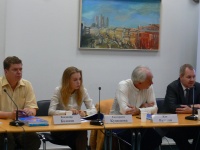Registration
You will receive an email confirming your registration.
IMGXYZ2597IMGZYXThe effects of globalization have spread to every corner of the world. Yet while the basic concept of globalization is the same worldwide, its manifestations can differ significantly. The French newspaper Le Monde Diplomatique set itself the task of collecting and publishing information on how globalization is affecting different parts of the world in its Atlas 2010. The Russian version of the atlas, published by the Center for Post-Industrial Studies with assistance from the LSR Group, was presented at an event at the Carnegie Moscow Center.
Vladislav Inozemtsev, director of the Center for Post-Industrial Studies and publisher of the Russian version of the atlas; Ekaterina Kuznetsova of the Center for Post-Industrial Studies; Jean Radvanyi of the Franco-Russian Center for the Humanities and Social Sciences in Moscow and member of the French editorial board of the atlas; and Vladimir Kolosov of the Russian Academy of Sciences’ Institute of Geography gathered to discuss the atlas and its contribution to public discourse. The discussion was moderated by Carnegie’s Nikolay Petrov.
The Atlas
Each Le Monde Diplomatique atlas collects and systematizes information on the geopolitical situation in the world. They combine maps with ideological and theoretical texts, created by journalists from Le Monde Diplomatique and also by external experts on various issues covered by the atlas.
In 2007, the first Russian edition of the atlas (based on the original Atlas 2006) was printed. It was met with great interest. This edition carried an additional chapter on Russia. The new 2010 Russian edition of the Atlas 2010 contains an additional chapter on the Commonwealth of Independent States (CIS), which analyzes the situation in the post-Soviet region. This chapter aims to put the spotlight on problems in the CIS countries that get little coverage and attention in Russia, Kuznetsova explained.
Description of the Atlas 2010
- Subjects and Tasks: The atlas presents a critical analysis of globalization, offering a comprehensive examination of the factors involved and assessing their influence on economic, social, and political processes in various parts of the world, such as United States, Europe, China, Russia, Africa, South Caucasus and others, explained Radvanyi.
- Rejection of Eurocentrism: One of the distinguishing features of the atlas is that its authors attempted to move away from a Eurocentric view of the world. This enabled a deeper analysis of the factors that are shaping the globalization process in different parts of the world, especially in those areas (for example, Africa), on which European researchers hadn’t focused closely.
- Maps: The numerous and diverse maps in the atlas present information in a visual and easy to use way; examples of maps include a map on immigration and failed immigration attempts into the European Union and a hand-drawn map on the global integration of India.
- Abundance of Factual Information: The atlas provides an abundance of data, presented in texts as well as charts, tables, and graphs, which allow readers to draw their own conclusions on trends in the modern world, Inozemtsev noted.
Although Kolosov expressed concern that the atlas presents various facts but does not offer many conclusions, the participants of the discussion reiterated that the publication of Atlas 2010 in Russian has created a significant and important resource for the Russian-speaking audience. Ultimately, the new edition will give interested readers the chance to enrich and systematize their perceptions of the world.
